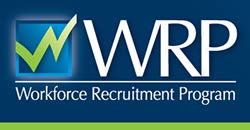Workforce Recruitment Program

The Workforce Recruitment Program (WRP) is a recruitment and referral program that connects federal and private sector employers nationwide with highly motivated college students and recent graduates with disabilities. This fall, thirty applicants will personally interview with a trained WRP federal agency recruiter at the University of Washington in hopes of connecting with great summer or permanent opportunities. Participants have a wide range of career interests and backgrounds.
During the interview process, students receive assistance developing a federal version of their resume, preparing for the interview questions and practicing via mock interviews. Participants who complete WRP interviews are included in a national database that captures their resume, transcripts, highlighted skills, locations where they would like to work, their schedule A status and a summary of their recruiter interview. The student information in this database is made available to employers for one year. During that time, employers reach out to participants and invite them to apply for open positions. Since it’s beginning in 1995, over 6,000 participants have received temporary and permanent employment through WRP.
“The WRP program not only helps students find temporary or permanent employment, but it also offers resources like having you resume posted on their database, which allows students to be contacted by employers. Since being a part of the WRP program I have been contacted by the Department of the Army, Veteran Affairs, and a private recruiting firm in Philadelphia. These resources are beneficial because they let you know there are many options available,” Said Shelby Keith, a DO-IT Ambassador and WRP participant.
DO-IT’s support of student participation in this event was funded by the Mitsubishi Electric America Foundation (MEAF) as a part of the AccessSTEM Careers project. For more information on WRP, consult their website. WRP is managed by the U.S. Department of Labor’s Office of Disability Employment Policy (ODEP) and the U.S. Department of Defense’s Office of Diversity Management and Equal Opportunity (ODMEO).